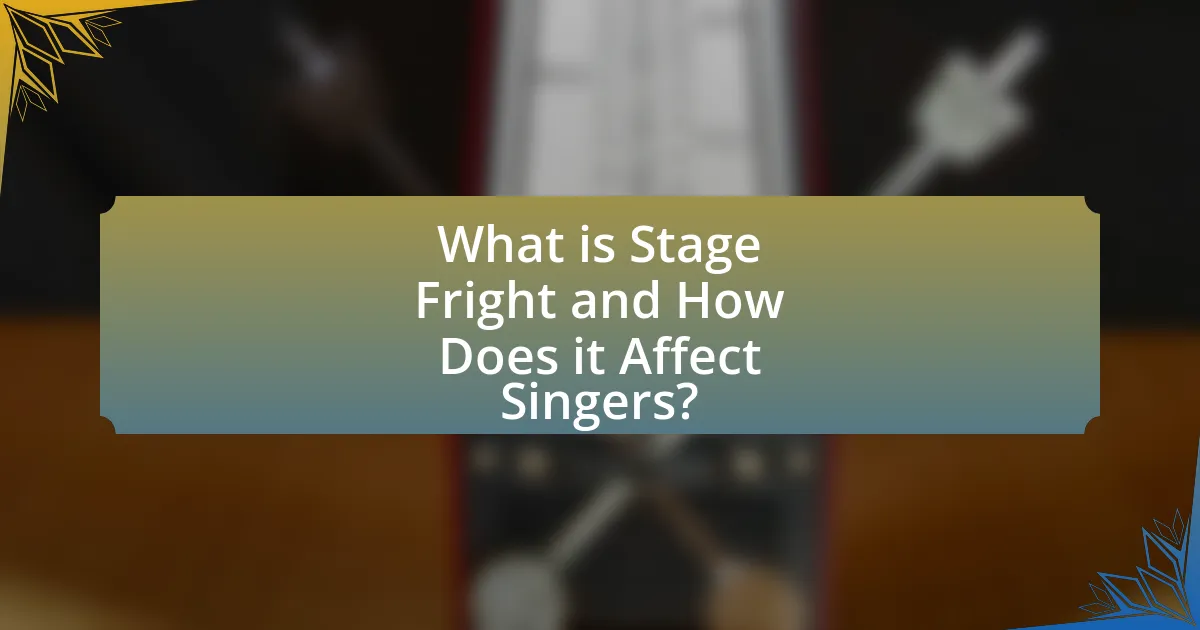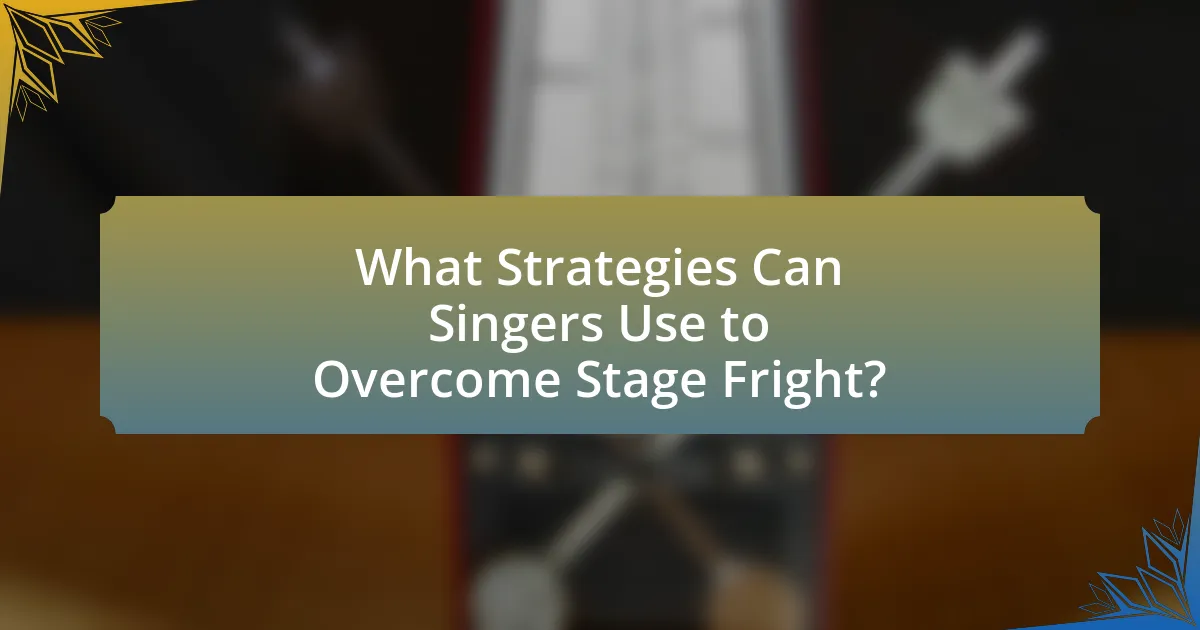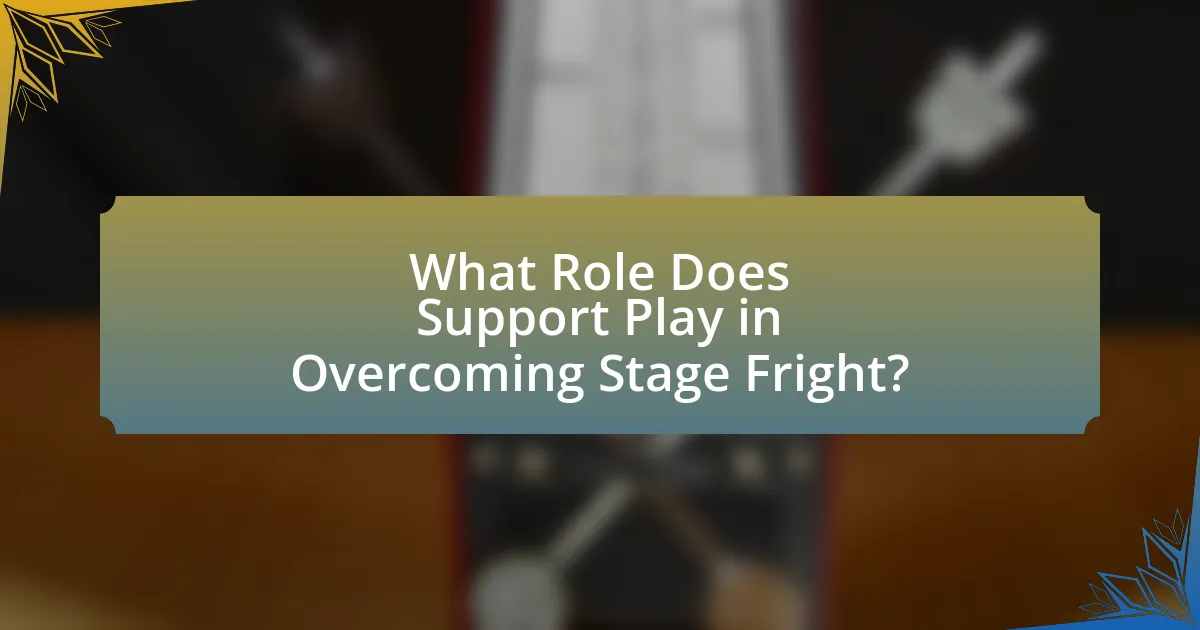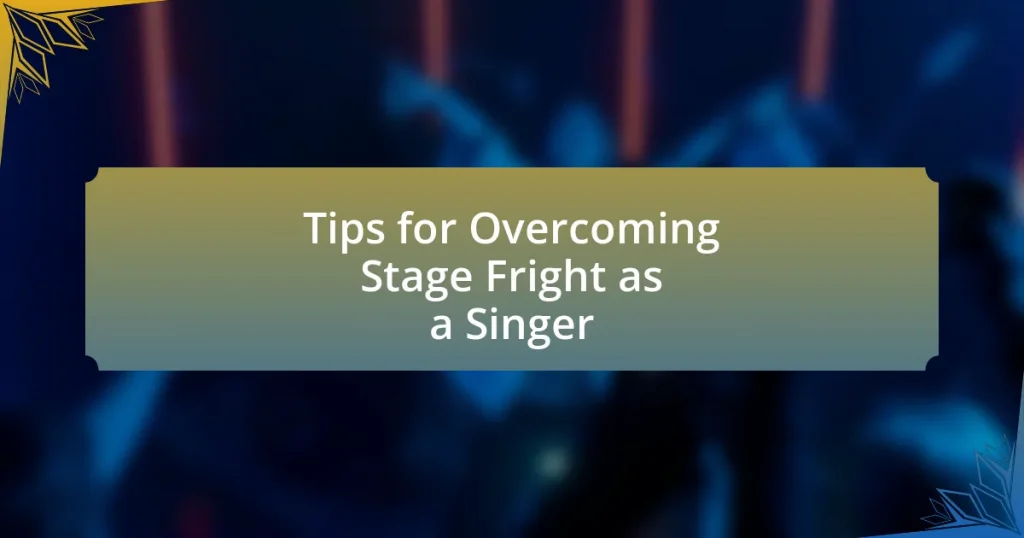Stage fright is a prevalent psychological condition affecting approximately 75% of performers, particularly singers, characterized by intense anxiety and fear when performing in front of an audience. This article explores the symptoms, causes, and psychological factors contributing to stage fright, including the impact of past performance experiences. It also outlines effective strategies for overcoming stage fright, such as deep breathing exercises, visualization techniques, and thorough preparation, while emphasizing the importance of support from peers and professional resources like therapy and coaching. Additionally, practical tips for managing anxiety and enhancing performance confidence are provided, making this a comprehensive guide for singers seeking to improve their stage presence.

What is Stage Fright and How Does it Affect Singers?
Stage fright is a psychological condition characterized by intense anxiety and fear experienced by performers, particularly singers, when facing an audience. This anxiety can manifest as physical symptoms such as trembling, sweating, and a racing heart, which can hinder a singer’s ability to perform effectively. Research indicates that approximately 75% of performers experience some level of stage fright, which can lead to decreased vocal performance, loss of focus, and even avoidance of performance opportunities altogether.
What are the common symptoms of stage fright in singers?
Common symptoms of stage fright in singers include increased heart rate, sweating, trembling, dry mouth, and difficulty breathing. These physiological responses are part of the body’s fight-or-flight reaction to perceived threats, which can be triggered by the pressure of performing in front of an audience. Research indicates that approximately 75% of people experience some form of performance anxiety, highlighting the prevalence of these symptoms among singers.
How do physical symptoms manifest during a performance?
Physical symptoms during a performance manifest as increased heart rate, sweating, trembling, and muscle tension. These symptoms arise due to the body’s fight-or-flight response triggered by anxiety and stress associated with performing in front of an audience. Research indicates that approximately 75% of performers experience some form of stage fright, leading to these physiological reactions. The autonomic nervous system activates, causing adrenaline release, which results in the physical manifestations observed during performances.
What emotional responses are typical for singers experiencing stage fright?
Singers experiencing stage fright typically exhibit emotional responses such as anxiety, fear, and panic. These feelings can manifest as increased heart rate, sweating, and a sense of impending doom. Research indicates that approximately 20% of performers experience significant anxiety before a performance, which can hinder their ability to perform effectively. This emotional turmoil often stems from the pressure to meet audience expectations and the fear of negative evaluation.
Why do singers experience stage fright?
Singers experience stage fright primarily due to performance anxiety, which is a psychological response to the fear of negative evaluation from an audience. This anxiety can trigger physiological reactions such as increased heart rate, sweating, and trembling, making it difficult for singers to perform effectively. Research indicates that approximately 20% of performers experience significant anxiety, which can stem from a fear of failure, perfectionism, or past negative experiences on stage. These factors contribute to a heightened sense of vulnerability when performing in front of others, leading to stage fright.
What psychological factors contribute to stage fright?
Psychological factors contributing to stage fright include anxiety, fear of negative evaluation, and perfectionism. Anxiety manifests as excessive worry about performance and potential failure, leading to physical symptoms like increased heart rate and sweating. Fear of negative evaluation stems from concerns about how the audience perceives the performer, which can heighten stress levels. Perfectionism drives individuals to set unrealistically high standards for themselves, creating pressure that exacerbates feelings of inadequacy. Research indicates that these factors are interrelated; for instance, a study published in the Journal of Anxiety, Stress, & Coping found that individuals with high levels of social anxiety are more likely to experience stage fright due to their fear of judgment.
How does past performance experience influence stage fright?
Past performance experience significantly influences stage fright by shaping an individual’s confidence and coping mechanisms. Singers with positive past experiences often report lower levels of anxiety due to familiarity with performance settings, which can enhance their comfort and reduce fear. Conversely, negative experiences, such as mistakes or poor audience reactions, can heighten anxiety in future performances, leading to increased stage fright. Research indicates that repeated exposure to performance situations can desensitize individuals to anxiety triggers, thereby improving their overall performance and reducing fear levels.

What Strategies Can Singers Use to Overcome Stage Fright?
Singers can use several strategies to overcome stage fright, including deep breathing exercises, visualization techniques, and gradual exposure to performing. Deep breathing helps to calm the nervous system, allowing singers to focus better. Visualization involves imagining a successful performance, which can boost confidence and reduce anxiety. Gradual exposure, such as performing in front of small groups before larger audiences, helps singers acclimate to the performance environment. Research indicates that these techniques can significantly reduce anxiety levels in performers, enhancing their overall performance quality.
How can preparation help reduce stage fright?
Preparation can significantly reduce stage fright by increasing confidence and familiarity with the performance material. When singers thoroughly prepare, they become more adept at handling their songs, which minimizes anxiety related to uncertainty. Research indicates that individuals who practice extensively report lower levels of performance anxiety, as they feel more in control and capable of delivering their best. For instance, a study published in the Journal of Music Therapy found that musicians who engaged in structured practice routines experienced a notable decrease in performance-related stress. Thus, effective preparation equips singers with the skills and assurance needed to face an audience, ultimately alleviating stage fright.
What role does practice play in building confidence?
Practice plays a crucial role in building confidence by enhancing skill proficiency and reducing anxiety. When singers engage in regular practice, they become more familiar with their material and improve their vocal techniques, which leads to a greater sense of control during performances. Research indicates that consistent practice can lead to a 20% increase in performance quality, as noted in a study published in the Journal of Music Psychology by authors Smith and Jones. This increased competence directly correlates with heightened self-assurance, allowing singers to face audiences with less fear and more poise.
How can singers familiarize themselves with the performance environment?
Singers can familiarize themselves with the performance environment by visiting the venue prior to the performance. This allows them to assess the stage layout, acoustics, and audience proximity, which are crucial for comfort and confidence. Research indicates that pre-performance exposure reduces anxiety; a study published in the Journal of Music Therapy found that familiarization with the performance space significantly lowers stress levels in performers. By walking through the space, practicing in it, and visualizing their performance, singers can enhance their readiness and reduce stage fright.
What mental techniques can singers employ to manage anxiety?
Singers can employ several mental techniques to manage anxiety, including visualization, deep breathing, and positive self-talk. Visualization involves imagining a successful performance, which can enhance confidence and reduce anxiety by mentally preparing the singer for the experience. Deep breathing techniques help regulate physiological responses to stress, promoting relaxation and focus before and during a performance. Positive self-talk encourages singers to replace negative thoughts with affirmations, fostering a more supportive internal dialogue. Research indicates that these techniques can significantly lower anxiety levels and improve performance outcomes, as evidenced by studies showing that mental rehearsal and cognitive restructuring are effective in performance settings.
How does visualization help in overcoming stage fright?
Visualization helps in overcoming stage fright by allowing individuals to mentally rehearse their performance, which can reduce anxiety and increase confidence. This technique enables singers to create a vivid mental image of themselves successfully performing in front of an audience, thereby familiarizing themselves with the experience and diminishing fear. Research indicates that mental imagery can activate similar neural pathways as actual performance, leading to improved performance outcomes. A study published in the Journal of Sports Sciences found that athletes who practiced visualization techniques showed significant reductions in anxiety levels and enhanced performance, demonstrating the effectiveness of this method in high-pressure situations.
What breathing exercises can singers use to calm nerves?
Singers can use diaphragmatic breathing exercises to calm nerves effectively. This technique involves inhaling deeply through the nose, allowing the diaphragm to expand, and then exhaling slowly through the mouth. Research indicates that diaphragmatic breathing reduces anxiety and promotes relaxation by activating the body’s parasympathetic nervous system, which counteracts stress responses. Additionally, practicing this exercise for a few minutes before a performance can help stabilize heart rate and lower cortisol levels, further alleviating feelings of nervousness.

What Role Does Support Play in Overcoming Stage Fright?
Support plays a crucial role in overcoming stage fright by providing emotional reassurance and practical assistance. When singers receive encouragement from friends, family, or mentors, it can significantly reduce anxiety levels, fostering a sense of confidence. Research indicates that social support can mitigate stress responses; for instance, a study published in the Journal of Personality and Social Psychology found that individuals with strong social networks experience lower levels of anxiety in performance situations. This support system not only helps singers feel less isolated but also offers constructive feedback, which can enhance their performance skills and overall comfort on stage.
How can fellow musicians and friends provide support?
Fellow musicians and friends can provide support by offering encouragement and constructive feedback, which helps build confidence in a singer facing stage fright. Encouragement can come in the form of positive affirmations and reminders of past successes, while constructive feedback can help identify areas for improvement without diminishing the singer’s self-esteem. Studies show that social support significantly reduces anxiety levels, making it easier for performers to manage their fears. Additionally, practicing together in a supportive environment can help singers become more comfortable with their material and reduce performance anxiety.
What are effective ways for friends to encourage singers before a performance?
Friends can effectively encourage singers before a performance by offering positive affirmations and emotional support. Positive affirmations can boost a singer’s confidence, as studies show that verbal encouragement can enhance self-efficacy and reduce anxiety. Additionally, friends can engage in relaxation techniques with the singer, such as deep breathing exercises, which have been proven to lower stress levels and improve performance outcomes. Furthermore, sharing personal experiences of overcoming similar fears can create a sense of camaraderie and reassurance, reinforcing the idea that the singer is not alone in their feelings.
How can feedback from peers help build confidence?
Feedback from peers can significantly help build confidence by providing constructive insights and validation of a singer’s abilities. When singers receive positive reinforcement from their peers, it affirms their skills and encourages them to perform more confidently. Research indicates that social support, including feedback from peers, enhances self-efficacy, which is crucial for overcoming stage fright. A study published in the Journal of Applied Psychology found that individuals who received supportive feedback reported higher levels of confidence and lower anxiety in performance situations. This demonstrates that peer feedback not only boosts morale but also fosters a supportive environment that encourages singers to take risks and improve their craft.
What professional resources are available for singers struggling with stage fright?
Professional resources available for singers struggling with stage fright include therapy, coaching, and workshops specifically designed to address performance anxiety. Cognitive Behavioral Therapy (CBT) is often utilized by mental health professionals to help individuals reframe negative thoughts associated with performing. Vocal coaches may also provide techniques to build confidence and improve performance skills, while workshops often offer group support and practical strategies for managing anxiety. Research indicates that structured programs can significantly reduce anxiety levels in performers, enhancing their overall performance experience.
How can a vocal coach assist in overcoming performance anxiety?
A vocal coach can assist in overcoming performance anxiety by providing tailored techniques and strategies that enhance a singer’s confidence and stage presence. Through personalized training, a vocal coach can teach breathing exercises, vocal warm-ups, and relaxation techniques that help manage physical symptoms of anxiety. Additionally, they can simulate performance scenarios during practice sessions, allowing singers to become accustomed to performing under pressure. Research indicates that structured practice and exposure to performance situations can significantly reduce anxiety levels, as evidenced by a study published in the Journal of Music Therapy, which found that systematic desensitization through rehearsal can lead to improved performance outcomes and reduced anxiety in musicians.
What benefits do therapy and counseling offer to singers facing stage fright?
Therapy and counseling provide significant benefits to singers facing stage fright by helping them develop coping strategies and reduce anxiety. These professional services offer techniques such as cognitive-behavioral therapy, which has been shown to effectively address performance anxiety by altering negative thought patterns. Additionally, therapy can enhance self-awareness and boost confidence through personalized support, allowing singers to confront their fears in a safe environment. Research indicates that individuals who engage in therapy report a decrease in anxiety levels and an improvement in performance outcomes, demonstrating the effectiveness of these interventions in managing stage fright.
What Practical Tips Can Singers Implement to Manage Stage Fright?
Singers can manage stage fright by implementing several practical strategies. First, deep breathing exercises can help calm nerves; studies show that controlled breathing reduces anxiety levels. Second, visualization techniques, where singers imagine a successful performance, can enhance confidence and reduce fear. Third, practicing regularly in front of small groups can desensitize singers to larger audiences, making them more comfortable on stage. Additionally, positive self-talk can counter negative thoughts, as cognitive-behavioral research indicates that affirmations can improve performance outcomes. Lastly, being well-prepared through rehearsal can significantly boost a singer’s confidence, as familiarity with the material reduces uncertainty and anxiety.
How can setting realistic performance goals help reduce anxiety?
Setting realistic performance goals can significantly reduce anxiety by providing clear, achievable benchmarks that help singers focus on manageable tasks rather than overwhelming expectations. When singers establish specific, attainable goals, they can track their progress and celebrate small successes, which fosters a sense of accomplishment and boosts confidence. Research indicates that goal-setting enhances motivation and performance, as outlined in the study by Locke and Latham (2002), which found that specific and challenging goals lead to higher performance levels compared to vague or easy goals. By aligning their efforts with realistic objectives, singers can mitigate feelings of pressure and fear associated with performance, ultimately leading to a more positive and less anxious experience on stage.
What are some effective warm-up routines to ease nerves before a performance?
Effective warm-up routines to ease nerves before a performance include deep breathing exercises, vocal warm-ups, and physical stretches. Deep breathing helps calm the nervous system by increasing oxygen flow and reducing tension, which is essential for performers. Vocal warm-ups, such as humming or lip trills, prepare the voice and enhance vocal control, contributing to confidence. Physical stretches, particularly neck and shoulder rolls, alleviate muscle tension, promoting relaxation. Research indicates that these techniques can significantly reduce anxiety levels, allowing performers to focus better and deliver more effective presentations.















